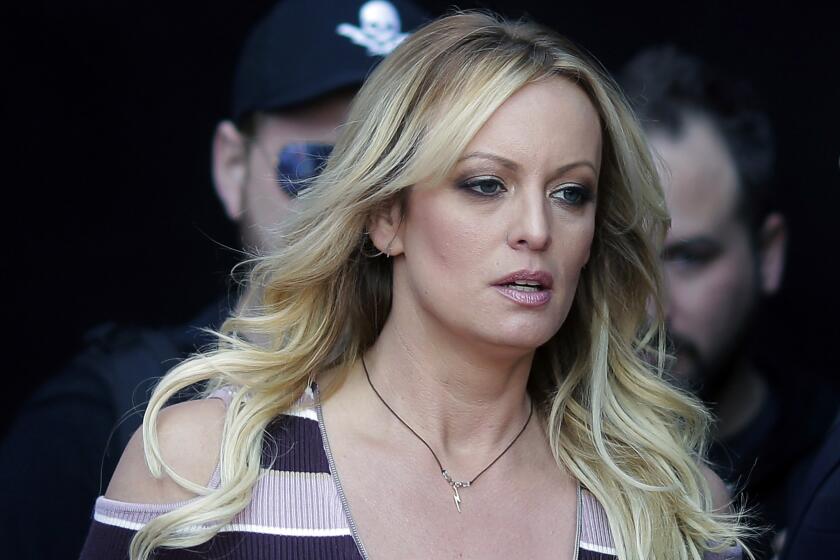Iraqi Tribunal Calls Delay in Trial of Hussein
Immersed in a growing leadership crisis, the Iraqi High Tribunal abruptly delayed a scheduled resumption of Saddam Hussein’s trial Tuesday amid bickering among its judges over the surprise appointment of a new chief of their trial panel.
After a morning of closed-door exchanges among the five trial judges, the tribunal’s spokesman issued a terse announcement of the five-day delay. He cited the absence of witnesses who were to testify this week but supposedly had not yet returned from the hajj pilgrimage to Saudi Arabia, which ended 10 days ago.
One of the trial judges, Hussein Moussawi, said the official explanation was “just an excuse” to give the judges time for “long discussions” needed to resolve issues surrounding a shake-up of their panel, which lost two members during the monthlong recess that was to have ended Tuesday.
Moussawi would not elaborate, but other court officials, who spoke on condition of anonymity, said the trial panel was sharply divided over whether to accept the appointment Monday of Raouf Rasheed Abdel Rahman as its leader.
Defense lawyers called the turmoil a symptom of political pressure to rush the trial and convict Hussein and his seven co-defendants.
“There’s too much violence in the country, too much division, too much pressure on the court,” former U.S. Atty. Gen. Ramsey Clark, who is here as part of the defense team, told CNN. “The project ought to be abandoned. It was a creature of the United States in the first place.”
The 3-month-old trial was meant to be a landmark in Iraq’s democratic development, but it has been beset by procedural delays, unruly outbursts by the defendants, and the killings of two defense lawyers. Until this month the tribunal, set up by the United States after its forces overthrew Hussein in 2003, appeared to be weathering fierce criticism from the deposed dictator’s supporters in the Sunni Arab-led insurgency as well as the Shiite Muslims who lead Iraq’s government.
But on Jan. 9, Rizgar Mohammed Amin quit as chief of the trial panel, complaining of Iraqi government pressure on him to rein in the defendants’ outbursts and speed up the trial.
His fellow judges chose one of their number, Said Hammashi, to take over. But Hammashi, the most senior member, was unexpectedly removed from the panel Monday after a government commission responsible for purging Hussein’s supporters from public office said that he had once belonged to the dictator’s Baath Party.
Rahman was named to lead the trial panel instead, moving from a different chamber of the court. A court spokesman announced the appointment without explaining how it had been decided upon.
Judges who opposed the appointment argued that it had been imposed from outside the tribunal and violated a procedure that replacement judges must come from the trial panel’s reserve bench, court officials said. Moussawi said some members on the panel were lobbying for the return of Amin after he recovers from eye surgery.
Amin had resisted two weeks of appeals by his colleagues to stay on the case, but Moussawi said, “There is a big possibility that he will come back next week.”
As the judges argued in chamber, defense attorneys and reporters were brought to the heavily guarded courthouse in Baghdad’s Green Zone to await the eighth session of the often-delayed trial. They had been told to expect testimony from additional witnesses to the summary executions of more than 140 men and boys from the Shiite village of Dujayl in the early 1980s -- the crime with which the defendants are charged.
Four hours after the trial was due to start, the spokesman announced it was being put off until Sunday and hastily left.
The postponement came as sectarian tensions simmered across Iraq.
About 100 Shiite demonstrators in the southern city of Basra demanded that British troops free 14 men arrested Tuesday in predawn raids. The detainees, including a deputy provincial chief of intelligence and at least four other policemen, were suspected of taking part in killings and kidnappings orchestrated by local Shiite militias.
Basra’s provincial council, in an emergency meeting with Gov. Mohammed Musabah Waily, also called for the detainees’ release. The British military said it got Iraqi government authority to arrest the men. Nine were later let go.
In the northern city of Samarra, more than 400 Sunnis marched to condemn the execution-style killings of 31 Sunnis abducted on their way home after being rejected as cadets at a police academy in Baghdad.
Elsewhere, a Sunni clerical group, the Muslim Scholars Assn., accused forces of the Shiite-led Interior Ministry in the deaths of three men and the abductions of 20 others Monday in a raid on a Sunni neighborhood of the capital.
The killings spilled into the political arena as the Iraqi Islamic Party warned its Sunni followers to be prepared to confront further armed attacks “by any suitable means.” The party heads an alliance that won 44 of the 275 seats in parliament in the Dec. 15 election.
Meanwhile, the U.S. military said four American troops were killed Monday: two soldiers in a Baghdad roadside bombing and two Marines in a vehicle accident west of the capital.
*
Times staff writer Zainab Hussein and a special correspondent in Basra contributed to this report.
More to Read
Start your day right
Sign up for Essential California for news, features and recommendations from the L.A. Times and beyond in your inbox six days a week.
You may occasionally receive promotional content from the Los Angeles Times.






